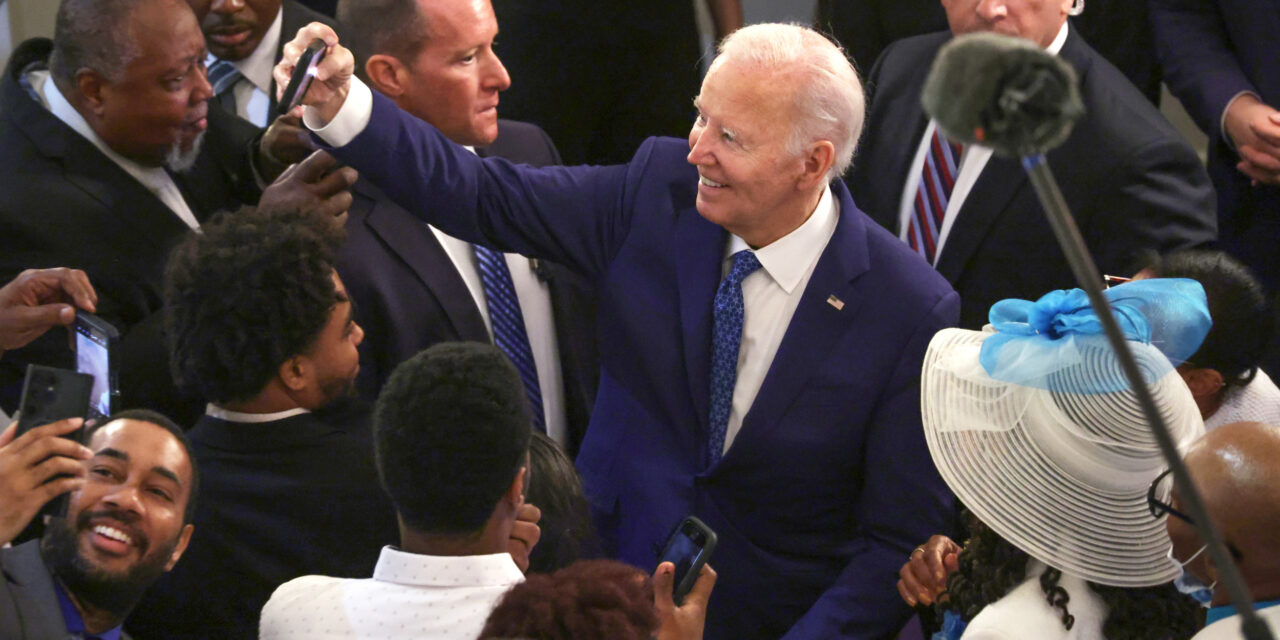
Growing up, my mother made my siblings and I attend church—eight days a week. This was a mandate in my Momma’s house. Church was our home away from home. The outside of the building was cream with white trim. Inside, there were stained-glass windows, high ceilings, and brown wooden pews. The pulpit was tall and deep with burgundy red carpeting. It was beautiful, yet the physical bones of the church are no comparison to the spirit moving within. The worship service was off the chain. There was a maelstrom of singing, shouting, and testifying to the goodness of the Lord. I can still hear and see the deacons suited-up and the mothers of the church in their elegant and colorful church-lady hats.
In the Black community, Sunday is a sacred day of gathering and community. The Black church remains an integral part of the Black experience.
So it’s no surprise that last Sunday, as questions of his ability to campaign for President grew louder, President Biden did what any Democratic politician would do: He went to Philadelphia to attend service at a Black church. Politically, it makes sense. Black voters are overwhelmingly loyal to the Democratic Party, and when Democratic politicians need votes, they want to make sure they secure their base.
As a church-going woman of the Black liberation tradition, my initial reaction was to shake my head in displeasure. Too often, those looking for votes run to our churches during election season—and only election season—only to ignore us while they write laws that harm us.
This is not specific to any one candidate, or any one political party. Just last month, former President Donald Trump spoke at a Black church in Detroit, Michigan. While the audience was mostly white, the goal, which totally missed the mark, was to demonstrate that he sees us and seeks out our support. This type of artificial coalescing around the Black community is not new.
One thing is clear: Black voters are in demand, and we have leverage.
 U.S. President Joe Biden poses with supporters for selfies during a campaign stop at Mt. Airy Church of God in Christ on July 7, 2024 in Philadelphia, Pennsylvania. President Biden continued to campaign amid mounting… U.S. President Joe Biden poses with supporters for selfies during a campaign stop at Mt. Airy Church of God in Christ on July 7, 2024 in Philadelphia, Pennsylvania. President Biden continued to campaign amid mounting pressure for him to drop out from running for his re-election bit. Alex Wong/Getty Images
U.S. President Joe Biden poses with supporters for selfies during a campaign stop at Mt. Airy Church of God in Christ on July 7, 2024 in Philadelphia, Pennsylvania. President Biden continued to campaign amid mounting… U.S. President Joe Biden poses with supporters for selfies during a campaign stop at Mt. Airy Church of God in Christ on July 7, 2024 in Philadelphia, Pennsylvania. President Biden continued to campaign amid mounting pressure for him to drop out from running for his re-election bit. Alex Wong/Getty Images
It is not just the presidential candidates who run to us; congressional candidates, gubernatorial candidates, mayoral candidates, city council candidates—everybody and their momma comes to us for our votes.
My question to us is, what are we going to do with this power and leverage?
While all these candidates clearly need us, what has been done over the decades to close the racial wealth gap and address issues like Black maternal mortality rates?
In 2015, as the highest ranking Black woman in the Ohio Democratic Party, I knew for Democrats to win the presidency in 2016, we needed to win in the Midwest, and Ohio was the critical swing state. I also knew that the path to victory for Democrats in Ohio relied on Black voter turnout, as is still the case. I set out on a fact-finding mission to speak with Black people across Ohio, from elected leaders to community organizers to anyone I could talk to on the street. What I consistently heard was Black Ohioans were frustrated with their economic circumstances. They wanted what most Americans want—a higher quality of life that includes good jobs, universal healthcare, and a future for their children.
We know what happened in 2016 in Ohio.
Last month, I had the opportunity to tour the state of South Carolina with the South Carolina Legislative Progressive Caucus. We spoke with voters across the state, mostly Black voters, and heard similar frustrations to those I heard in 2015 in Ohio: Many elected officials enjoy our votes but do not address our struggles.
They want our rhythm, but will not address our blues.
With these elected officials and candidates up and down the ballot coming into our communities asking for our votes, we must make a demand and hold people accountable. Elected officials are there to work for us. While we may like some of them personally, these politicians are there to do a job. The purpose of government is service—period.
As Frederick Douglass famously said, “Power concedes nothing without a demand. It never did and it never will.”
So my message is for us to make a demand. And with every demand, there must be a consequence if said demand is not met. When these elected officials come into our communities, we must have a clear vision about what we want and need to move our communities from surviving to thriving. Our orientation must be aimed at securing public policy wins that generationally change conditions, with policies such as universal healthcare, closing the wealth gap, affordable housing, high-quality education, reparations, and the total reimagining of the legal system.
What we have received to this present moment is insufficient to the task of restoring and building our communities for generations to come. As a people, we owe it to ourselves, our children, and our ancestors not to accept institutional norms and the status quo. We must cloak ourselves in the liberation tradition and steady our resolve.
Together, once we recognize our collective power and make demands that are big and ambitious, we can create an America as good as its promise. Anything less is betrayal.
Nina Turner is a former Ohio state senator, a senior fellow at the Institute on Race, Power and Political Economy at the New School, and the founder of We Are Somebody.
The views expressed in this article are the writer’s own.
0){let uncommonKnowledgeContainerHtml=’
Uncommon Knowledge
Newsweek is committed to challenging conventional wisdom and finding connections in the search for common ground. ]]>



